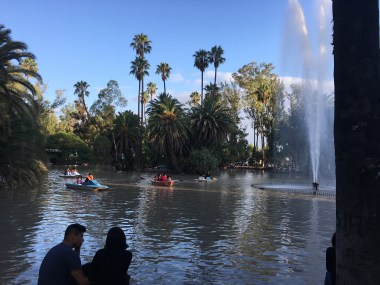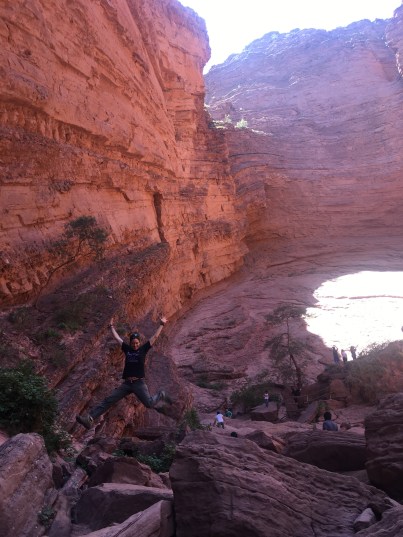I was heading south through “Mendoza’s Patagonia,” – the part of Argentina in the province of Mendoza that is located just north of the “official” Patagonia, which starts in the province of Neuquen. (I may have made up the term “Mendoza’s Patagonia” but it works.)
I had heard that the Patagonia is known for being more expensive than the north of Argentina, except for gas prices, because it is the major fossil fuel production region of Argentina. So it wasn’t so surprising that one of my first encounters was a guy about my age that worked in oil and gas. Martín lived in Buenos Aires but worked for an oil and gas company that was paying for him and his family to live in Malargüe, and they had been there for about a year. Those perks came at a price though because he said that weekend was going to be the first weekend he had off of work in the whole month.

Later I met Claudia, one of those unique and wonderful people that I connected with in a special way despite the fact that we were very different. I immediately recognized that she had a kind spirit, complemented by a strong personality, with a subtle hint of underlying anxiety.

She is a teacher in the tiny town of Ranquil Norte but lives in Malargüe (about 3-4 hours away). During the school year she stays the week in Ranquil Norte, living with a family there, and then takes the bus to be in Malargüe with her husband for the weekends.
Her husband just retired and didn’t know what to do with himself since she’s still working, so was coaching him through it (“you can visit your kids, go see new places, and when I retire we’ll go see new places, and sometimes just go to the park and drink mate”). Because she’s a teacher in a rural area, she’ll get to retire in a couple of years too. In Argentina, men retire at 65 and women at 60, but for teaching in a rural area one can retire a few years early.
Claudia taught me the proper way to pour hot water into the mate (“mah-tay“), because there is a technique that seems to be common across all of Argentina, and as her co-pilot, I was responsible for keeping the mate filled. She had a special electric mate that I had never seen before – it could be kept warm by plugging it in to the cigarette lighter in the car.

As we got to know each other, Claudia shared some personal stories about a rough and abusive young adulthood that she had ultimately overcome to find a peaceful and healthy life with her current husband. However, she confided in me, something had recently triggered some of her past traumas to resurface and she was working through them now (which might have explained the nervousness I sensed in her). She used a really great analogy that stuck with me. “Sometimes we do a good job of cleaning up the house and keeping it well maintained, but we left that one room in the back of the house with all the junk in it, locked up. Well, now is the time where I have to open up that room and start cleaning it out.”
One of the reasons we connected well was because we both really love writing, and she is the second person in my life that has told me that everyone should write a book in their life.*
We passed incredible landscapes of mountains, hills, and volcanoes. In fact, I couldn’t believe the number of volcanoes I saw off off to the left as we were heading south! I pulled out my map and realized that we were in fact passing through the Land of the Volcanoes. (I made that term up. If you look on a map, there is one area along the highway teeming with volcanoes, so it seems appropriate.)
The volcanoes are located in an area that has been named a provincial reserve called La Payunia, and includes more than 800 volcanic cones. (As a traveler one learns that there is no possible way that you can see everything that you want to see, and so this one was one of those places added to the list for future exploration.) But along the road, we could see huge black rocks – clearly dried lava from a past eruption, and even a canyon made of black lava rock.


In Ranquil Norte, the only place to get wifi was in the municipality building, so I headed there to log my whereabouts. The municipal building was basically a house – with kitchen, rooms with bunk beds, and a reception area. Since it is such a small town, people from the district municipality often come through and spend the night there as they make their way around the different rural towns administering services. I had arrived just as a group of three guys from the district municipality had grilled out for lunch and they invited me to share the “asado” (sausage and steak cooked on the grill) with them.

Along the highway I had seen quite a few bikers, and when I got to Chos Malal, I actually got the pleasure of meeting one of them. Dario is from Rosario and works with water pumps in high-rise buildings and had taken a month-long vacation on his motorcycle to explore the south. He had hesitated about doing something so “selfish”, but his (grown) children had encouraged him to do it. He said he was glad he had listened to them because it had been an incredible experience. Although he had had his moments of doubts that very same day.
That day we had passed a long section (more than an hour) of road that was not paved. Even Claudia in her pickup truck was really nervous about driving on that part, so I wasn’t surprised to hear that on a motorcycle it was tough. Apparently, it was so tough that Dario even asked himself a multiple times what he had been thinking and doubted if he would make it through. But he got through it and at the end of the day he was glad he had survived it and had overcome the challenge to be able to continue his journey and arrive in that cute little town of Chos Malal.

In addition to being a cute town, Chos Malal is the half-way point along La Ruta 40, which connects the northern border of Argentina (in the city of La Quiaca) with the southern-most part of Argentina to el Cabo Virgenes.
Most travelers who want to visit the Argentinian Patagonia take a flight to Bariloche, El Califate, or Ushuaia. After-all, the distances in Argentina are long – crossing Argentina from north to south is about the same distance as crossing the length of the US from east to west. (The journey I was taking, from Jujuy in the north to Ushuaia in the south, along La Ruta 40, is about 5,000 km or 3,100 mi – the equivalent of driving from Augusta, Maine to Los Angeles, CA.)
Spoiler alert: I only ever made it into northern Patagonia, but I don’t regret any minute of it! Stay tuned for the last chapter of my journeys along La Ruta 40.
Famous Footnotes
*Maybe this will one day turn into a book, but for now, here is my story in bite-sized pieces.












